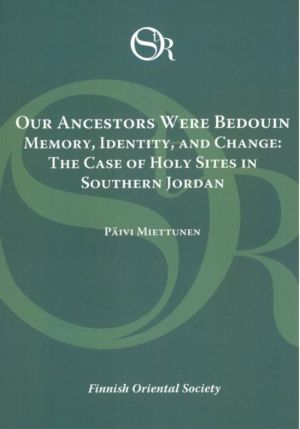ISSN0039-3282
Studia Orientalia 122
This study concentrates on three concepts: memory, identity and change. The study is about the concept of memory in the formation of a communal identity. Individual experiences and emotions are given interpretation and meaning on the basis of the individual's own sphere of knowledge, taught, and transmitted by his own culture and society. This memory then becomes the shared idea and ideal of the community, and when transmitted to the next generations it overcomes the boundaries of time. In this process, the memory, therefore, at the same time defines and is defined by the community itself. What people call "change" can be considered a constant process of remembering and forgetting.
The state of Jordan has created a national identity where the Bedouin past and culture are symbols promoted by the state. At the same time, the government has worked on the modernization of the Bedouins: the nomads are being sedentarized, while secular and religious education, modern technology, and health care are available even in those areas that in the past used to be the most dangerous peripheries. These processes have also influenced the identity of the inhabitants of southern Jordan in the last few decades, yet despite all the changes, the most prominent factors in their identity continue to be their tribal heritage and being a Bedouin.
This study is approaching these concepts through the case of the local "saints" (awliya'). In the everyday religion, these holy men and women have assumed an important role: people address the saints in order to gain health, wealth, rain, fertility, and protection, among other things. The fieldwork is conducted in southern Jordan and located multiple holy sites, many of them uncharted until now. Recording folklore and old memories of the sacred places while also observing the religious practices and everyday life of the local people have been the goal of this work.
ISSN0039-3282
Studia Orientalia 122
TieteenalatKansatiede, Kulttuurintutkimus, Uskontotiede
This study concentrates on three concepts: memory, identity and change. The study is about the concept of memory in the formation of a communal identity. Individual experiences and emotions are given interpretation and meaning on the basis of the individual's own sphere of knowledge, taught, and transmitted by his own culture and society. This memory then becomes the shared idea and ideal of the community, and when transmitted to the next generations it overcomes the boundaries of time. In this process, the memory, therefore, at the same time defines and is defined by the community itself. What people call "change" can be considered a constant process of remembering and forgetting.
The state of Jordan has created a national identity where the Bedouin past and culture are symbols promoted by the state. At the same time, the government has worked on the modernization of the Bedouins: the nomads are being sedentarized, while secular and religious education, modern technology, and health care are available even in those areas that in the past used to be the most dangerous peripheries. These processes have also influenced the identity of the inhabitants of southern Jordan in the last few decades, yet despite all the changes, the most prominent factors in their identity continue to be their tribal heritage and being a Bedouin.
This study is approaching these concepts through the case of the local "saints" (awliya'). In the everyday religion, these holy men and women have assumed an important role: people address the saints in order to gain health, wealth, rain, fertility, and protection, among other things. The fieldwork is conducted in southern Jordan and located multiple holy sites, many of them uncharted until now. Recording folklore and old memories of the sacred places while also observing the religious practices and everyday life of the local people have been the goal of this work.











